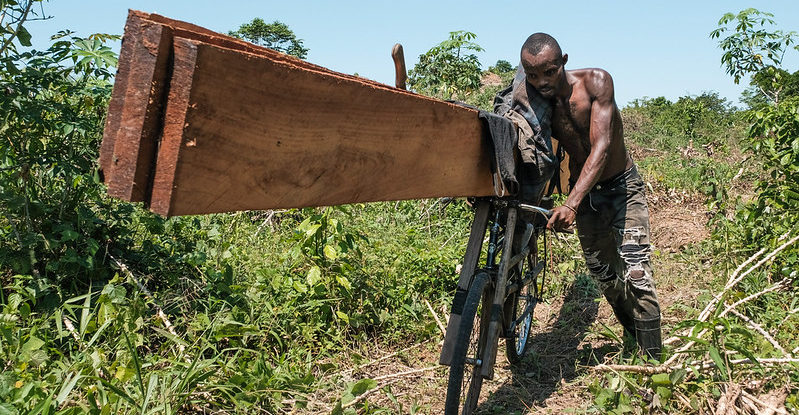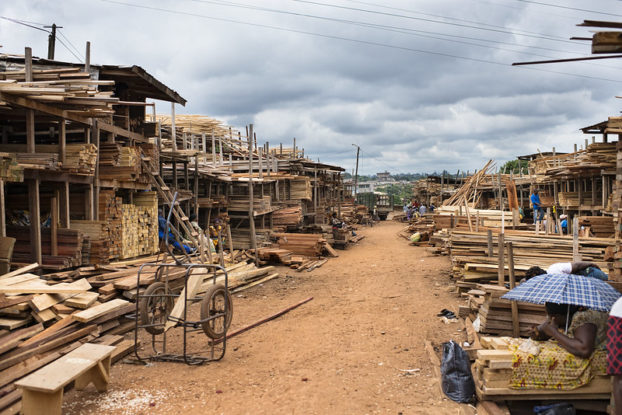
Central Africa’s national and regional timber markets are booming. Across the region, rapid population growth, urbanization and economic development are driving an increase in domestic demand for sawn timber, which in many countries is already more important in volume than demand for industrial timber for export.
However, consumers’ purchasing power remains weak, and in general they lack interest in the origin of the timber they buy – two important considerations that contribute to the prevailing informality of local markets. Domestic demand is mostly met by artisanal loggers, who are quite well organized, yet operate outside of existing legal frameworks.
The informal logging sector creates many jobs and generates significant revenues in both rural and urban areas. In Cameroon, for instance, chainsaw milling provides 45,000 direct jobs and generates more than 20 billion FCFA ($33 million) in revenues, according to a study led by the Center for International Forestry Research (CIFOR). But these jobs are precarious. Because small-scale timber producers lack legal protection, they have irregular incomes and their activities are vulnerable to corruption and authorities’ abuse.
According to Guillaume Lescuyer, a scientist with the French Agricultural Research Center for International Development (CIRAD) and an associate researcher with CIFOR, in this situation informality creates two main problems: first, it does not allow producers to improve their activities to make them more sustainable and profitable; and second, it contributes very little to government revenues.
“The sustainable use of forest resources should become a driver of development in Central Africa, but informality hinders economic growth and limits the potential benefits for both loggers and the government,” he added.
Furthermore, the status quo means that informal logging is leading to widespread deforestation and forest degradation, according to Richard Eba’a Atyi, CIFOR regional coordinator for Central Africa.
“Small-scale timber production is largely neglected by existing forest governance, which is designed to meet the needs of the industrial sector,” he said. “This situation makes it difficult to adopt policies that can seriously reduce the environmental impact of artisanal logging. Unless we bring the sector to light, it will be difficult to make it more sustainable.”

In some Central African countries, the volume of timber sold on the domestic market is greater than exports.
TRANSFORMING THE DOMESTIC MARKET
To address this situation, CIFOR recently launched the project “Promoting and Formalizing Artisanal Logging in Central Africa” (Promouvoir et formaliser l’exploitation artisanale du bois d’œuvre en Afrique centrale, PROFEAAC) which will be implemented until 2023. Mostly funded by the French Facility for Global Environment (FFEM), the project adopts an integrated approach to the formalization of artisanal logging that links the sustainable management of wood resources to the development of domestic demand for legal sawn timber.
The project seeks to build up the capacity of small-scale loggers to operate within the law by obtaining the necessary permits or titles, and to develop their commercial and financial competences to improve their living conditions. “Small-scale timber producers are very interested in formalizing their profession, so we are here to support them,” said Liboum Mbonayem, a research officer with CIFOR.
To achieve this, artisanal logging must be part of decentralized territorial development strategies, according to Mbonayem. “Involving elected government officials and local administrations to issue artisanal timber production permits for the local market will improve governance in the long term.”
To support formalization from the consumption side, the project will also promote demand for legally produced sawn timber on private and public markets. By using communication and advocacy strategies, CIFOR aims to increase the awareness of individual customers and the public and private sectors on the origin of timber.
“By the end of this project, we hope to have increased the share of legally produced timber sold in urban markets,” Lescuyer said. “We will not only create more awareness among the suppliers, but also among the various categories of buyers in the large cities.”
Lastly, to reduce the contribution of small-scale logging to forest degradation, the project will develop inexpensive methods for estimating and monitoring environmental impacts, and support local solutions for regeneration and reforestation of wood species and expansion of agroforestry systems.
“Our goal is to reduce forest degradation in Central Africa’s rural areas by formalizing and rationalizing small-scale timber production,” Eba’a Atyi said.
TARGET COUNTRIES
The project will be implemented in Cameroon and in the Democratic Republic of Congo (DRC) where small-scale chainsaw milling annual production is estimated to be 2.1 million and 3.4 million cubic meters (roundwood equivalents), respectively.
Although both countries have very huge domestic timber markets, their governance systems and characteristics of the local demand call for differentiated solutions.
CIFOR has selected two pilot sites in the East and the Center regions of Cameroon that supply the capital city of Yaoundé. The aim will be to promote the Timber Exploitation Permit (PEBO), as laid out in the 1994 Forestry Law. PEBO permits allow small-scale loggers to legally exploit and commercialize a limited volume of timber according to their technical and financial capacity.
In DRC, the project is operational in Tshopo province and the main regional markets it supplies, especially Kisangani. There are two types of permits that will be tested: the small-scale logging permit (Permis de Coupe Artisanale, PCA) for individual loggers, and the Local Community Forestry Concession (CFCL) for community managed forests.
A strong partnership with the government will be essential to reaching the project’s goals, according to Eba’a Atyi. “The Ministry of Forests and Wildlife in Cameroon and the Tshopo Provincial Coordination for the Environment and Sustainable Development will be our main institutional partners in the implementation of the project.”
Technical assistance will also be provided by other key partners such as CIRAD, the French National Research Institute for Sustainable Development (IRD), Tropenbos DRC and Ilexa-Bois (an association of small-scale loggers).
“This pool of expertise will help us develop the integrated approach that is needed to improve and formalize the sector,” Lescuyer said.
We want you to share Forests News content, which is licensed under Creative Commons Attribution-NonCommercial-ShareAlike 4.0 International (CC BY-NC-SA 4.0). This means you are free to redistribute our material for non-commercial purposes. All we ask is that you give Forests News appropriate credit and link to the original Forests News content, indicate if changes were made, and distribute your contributions under the same Creative Commons license. You must notify Forests News if you repost, reprint or reuse our materials by contacting forestsnews@cifor-icraf.org.